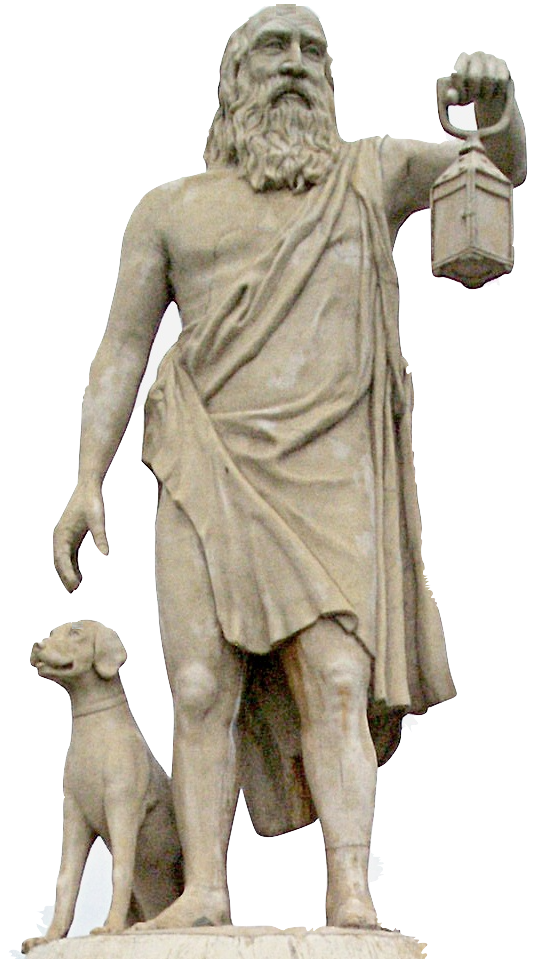
ディオゲネス
Diogenes 412-404 BC--323 BC

☆ ディオゲネス(/daɪˈz/ dy-OJ-in-eez; 古代ギリシア語: Διογένης, ローマ字表記: Diogénēs: Diogénēs [di.oɡénǠs])は、ギリシアの哲学者で、シノペのディオゲネス(Diogenes the Cynic; Διογένης Κυνικός, Diogénēs ho Kynikós)またはシノペのディオゲネス(Diogenes of Sinope)としても知られる。紀元前412年か404年にアナトリア黒海沿岸のイオニア植民地シノペで生まれ、紀元前323年にコリントで没した。ディオゲネスは物議を醸す人物であった。彼は通貨の堕落を理由にシノープから追放され、あるいは逃亡した。彼はシノペの造幣局長の息子であり、シノペの通 貨を堕落させたのが彼であったのか、父であったのか、あるいはその両方であったのかについては議論がある。ディオゲネスは海賊に捕らえられ、奴隷として売 られ、最終的にコリントに定住した。そこで彼は自分の哲学であるシニシズムをクラテスに伝え、クラテスはそれをシティウムのゼノンに教え、ゼノンはそれを ギリシア哲学の最も永続的な学派のひとつであるストア派へと発展させた。ディオゲネスに関する真正な著作は残っていないが、逸話(クレイア)、特にディオゲネス・ラエルティウスの著書『Lives and Opinions of Eminent Philosophers(著名な哲学者の生涯と意見)』やその他のいくつかの資料から、彼の生涯の詳細がわかっている[4]。彼は生活のために物乞い し、しばしば市場で大きな陶器の壺(ピトス)の中で寝た。彼はその質素な生活様式と行動で、腐敗し混乱した社会と見られる社会的価値観や制度を批判 した。彼は、非常に非伝統的な方法で好きな場所で寝食を共にし、自然に対して自らを厳しくすることで知られていた。彼は自らをコスモポリタンであり、ひと つの場所に忠誠を誓うのではなく、世界市民であると宣言した。彼はヘラクレスを手本とし、徳は理論よりも行動によって明らかにされると考えた。日中ランプを持ち歩き、"man"(ディオゲネスは周囲の人々を不誠実で 不合理と見なしていたため、英語ではしばしば "looking for an honest man "と表現される)を探していると主張するなど、哲学的なスタントで悪名高い人物となった。彼はプラトンを批判し、ソクラテスの解釈に異論を唱え、講義を妨 害し、時には議論中に食べ物を持ち込んで食べ、聴衆の気をそらした。ディオゲネスはまた、紀元前336年にアレクサンダー大王がコリントを訪れた際、公衆 の面前で、また面と向かって嘲笑したことでも知られている。
★︎だって俺たち犬儒派なんだもん▶︎だって俺たち犬儒派なんだもん: Part 2▶︎︎▶︎▶︎︎▶︎▶︎︎▶︎▶︎︎▶︎▶︎
| Diogenes
(/daɪˈɒdʒɪniːz/ dy-OJ-in-eez; Ancient Greek: Διογένης, romanized:
Diogénēs [di.oɡénɛːs]), also known as Diogenes the Cynic (Διογένης ὁ
Κυνικός, Diogénēs ho Kynikós) or Diogenes of Sinope, was a Greek
philosopher and one of the founders of Cynicism. He was born in Sinope,
an Ionian colony on the Black Sea coast of Anatolia, in 412 or 404 BC
and died at Corinth in 323 BC.[1] Diogenes was a controversial figure. He was banished, or he fled, from Sinope over debasement of currency. He was the son of the mintmaster of Sinope, and there is some debate as to whether it was he, his father, or both who had debased the Sinopian currency.[2] After his hasty departure from Sinope he moved to Athens where he proceeded to criticize many conventions of Athens of that day. There are many tales about him following Antisthenes and becoming his "faithful hound".[3] Diogenes was captured by pirates and sold into slavery, eventually settling in Corinth. There he passed his philosophy of Cynicism to Crates, who taught it to Zeno of Citium, who fashioned it into the school of Stoicism, one of the most enduring schools of Greek philosophy. No authenticated writings of Diogenes survive, but there are some details of his life from anecdotes (chreia), especially from Diogenes Laërtius' book Lives and Opinions of Eminent Philosophers and some other sources.[4] Diogenes made a virtue of poverty. He begged for a living and often slept in a large ceramic jar, or pithos, in the marketplace.[5] He used his simple lifestyle and behavior to criticize the social values and institutions of what he saw as a corrupt, confused society. He had a reputation for sleeping and eating wherever he chose in a highly non-traditional fashion and took to toughening himself against nature. He declared himself a cosmopolitan and a citizen of the world rather than claiming allegiance to just one place. He modeled himself on the example of Heracles, believing that virtue was better revealed in action than in theory. He became notorious for his philosophical stunts, such as carrying a lamp during the day, claiming to be looking for a "man" (often rendered in English as "looking for an honest man,” as Diogenes viewed the people around him as dishonest and irrational). He criticized Plato, disputed his interpretation of Socrates, and sabotaged his lectures, sometimes distracting listeners by bringing food and eating during the discussions. Diogenes was also noted for having mocked Alexander the Great, both in public and to his face when he visited Corinth in 336 BC.[6][7][8] |
ディオゲネス(/daɪˈz/
dy-OJ-in-eez; 古代ギリシア語: Διογένης, ローマ字表記: Diogénēs: Diogénēs
[di.oɡénǠs])は、ギリシアの哲学者で、シノペのディオゲネス(Diogenes the Cynic; Διογένης
Κυνικός, Diogénēs ho Kynikós)またはシノペのディオゲネス(Diogenes of
Sinope)としても知られる。紀元前412年か404年にアナトリア黒海沿岸のイオニア植民地シノペで生まれ、紀元前323年にコリントで没した
[1]。 ディオゲネスは物議を醸す人物であった。彼は通貨の堕落を理由にシノープから追放され、あるいは逃亡した。彼はシノペの造幣局長の息子であり、シノペの通 貨を堕落させたのが彼であったのか、父であったのか、あるいはその両方であったのかについては議論がある。ディオゲネスは海賊に捕らえられ、奴隷として売 られ、最終的にコリントに定住した。そこで彼は自分の哲学であるシニシズムをクラテスに伝え、クラテスはそれをシティウムのゼノンに教え、ゼノンはそれを ギリシア哲学の最も永続的な学派のひとつであるストア派へと発展させた。 ディオゲネスに関する真正な著作は残っていないが、逸話(クレイア)、特にディオゲネス・ラエルティウスの著書『Lives and Opinions of Eminent Philosophers(著名な哲学者の生涯と意見)』やその他のいくつかの資料から、彼の生涯の詳細がわかっている[4]。彼は生活のために物乞い し、しばしば市場で大きな陶器の壺(ピトス)の中で寝た[5]。彼はその質素な生活様式と行動で、腐敗し混乱した社会と見られる社会的価値観や制度を批判 した。彼は、非常に非伝統的な方法で好きな場所で寝食を共にし、自然に対して自らを厳しくすることで知られていた。彼は自らをコスモポリタンであり、ひと つの場所に忠誠を誓うのではなく、世界市民であると宣言した。 彼はヘラクレスを手本とし、徳は理論よりも行動によって明らかにされると考えた。日中ランプを持ち歩き、"man"(ディオゲネスは周囲の人々を不誠実で 不合理と見なしていたため、英語ではしばしば "looking for an honest man "と表現される)を探していると主張するなど、哲学的なスタントで悪名高い人物となった。彼はプラトンを批判し、ソクラテスの解釈に異論を唱え、講義を妨 害し、時には議論中に食べ物を持ち込んで食べ、聴衆の気をそらした。ディオゲネスはまた、紀元前336年にアレクサンダー大王がコリントを訪れた際、公衆 の面前で、また面と向かって嘲笑したことでも知られている[6][7][8]。 |
| Life Nothing is known about Diogenes's early life except that his father, Hicesias, was a banker.[9] It seems likely that Diogenes was also enrolled into the banking business aiding his father. At some point (the exact date is unknown), Hicesias and Diogenes became involved in a scandal involving the adulteration or debasement of the currency,[10] and Diogenes was exiled from the city and lost his citizenship and all his material possessions.[11][12] This aspect of the story seems to be corroborated by archaeology: large numbers of defaced coins (smashed with a large chisel stamp) have been discovered at Sinope dating from the middle of the 4th century BC, and other coins of the time bear the name of Hicesias as the official who minted them.[13] During this time there was much counterfeit money circulating in Sinope.[11] The coins were deliberately defaced in order to render them worthless as legal tender.[11] Sinope was being disputed between pro-Persian and pro-Greek factions in the 4th century, and there may have been political rather than financial motives behind the act. Athens 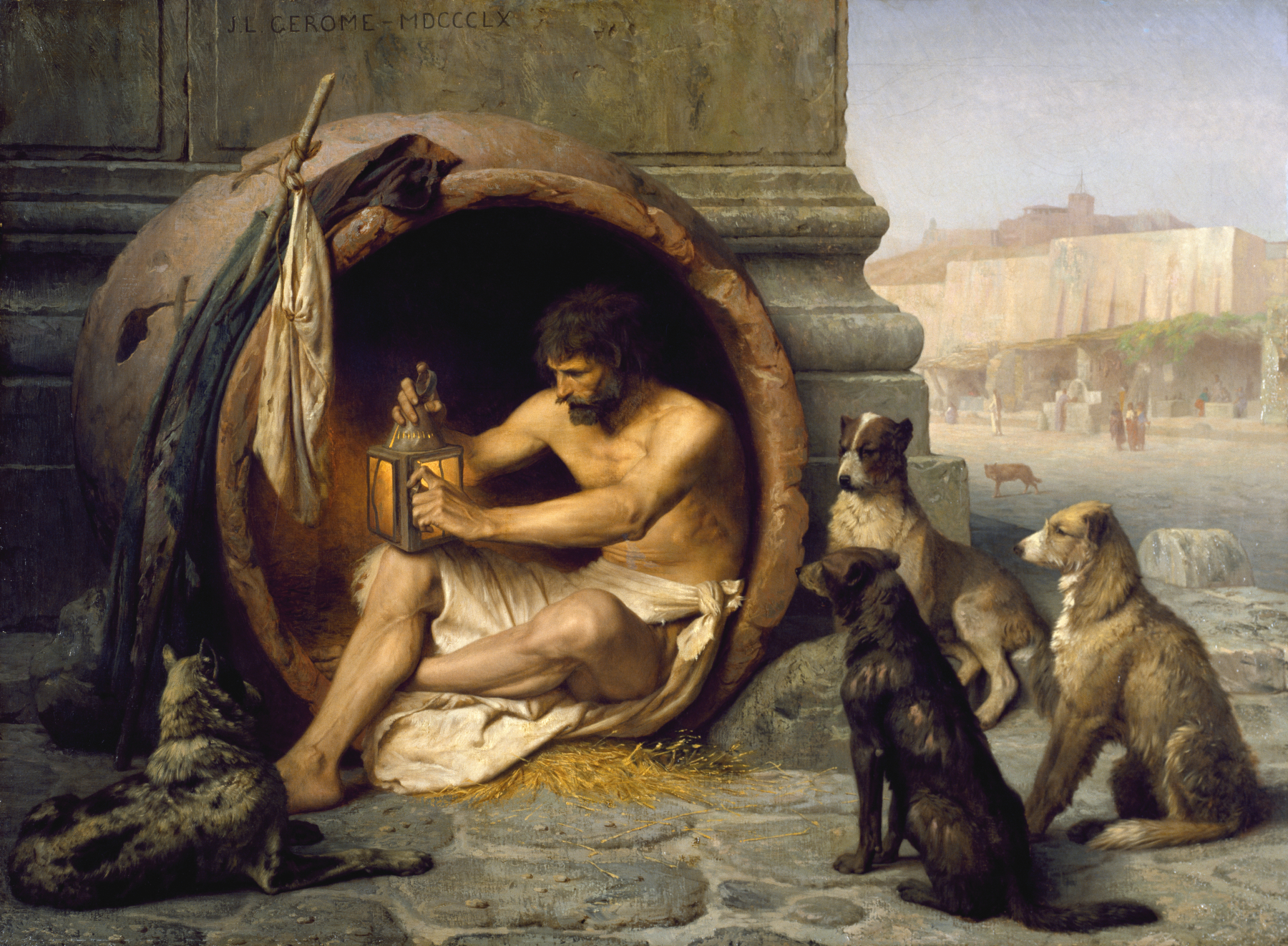 Diogenes Sitting in His Tub by Jean-Léon Gérôme (1860) According to one story,[12] Diogenes went to the Oracle at Delphi to ask for her advice and was told that he should "deface the currency". Following the debacle in Sinope, Diogenes decided that the oracle meant that he should deface the political currency rather than actual coins. He traveled to Athens and made it his life's goal to challenge established customs and values. He argued that instead of being troubled about the true nature of evil, people merely rely on customary interpretations. Diogenes arrived in Athens with a slave named Manes who escaped from him shortly thereafter. With characteristic humor, Diogenes dismissed his ill fortune by saying, "If Manes can live without Diogenes, why not Diogenes without Manes?"[14] Diogenes would mock such a relation of extreme dependency. He found the figure of a master who could do nothing for himself contemptibly helpless. He was attracted by the ascetic teaching of Antisthenes, a student of Socrates. When Diogenes asked Antisthenes to mentor him, Antisthenes ignored him and reportedly "eventually beat him off with his staff". Diogenes responded, "Strike, for you will find no wood hard enough to keep me away from you, so long as I think you've something to say." Diogenes became Antisthenes's pupil, despite the brutality with which he was initially received.[15] Whether the two ever really met is still uncertain,[16][17][18] but he surpassed his master in both reputation and the austerity of his life. He considered his avoidance of earthly pleasures a contrast to and commentary on contemporary Athenian behaviors. This attitude was grounded in a disdain for what he regarded as the folly, pretence, vanity, self-deception, and artificiality of human conduct. 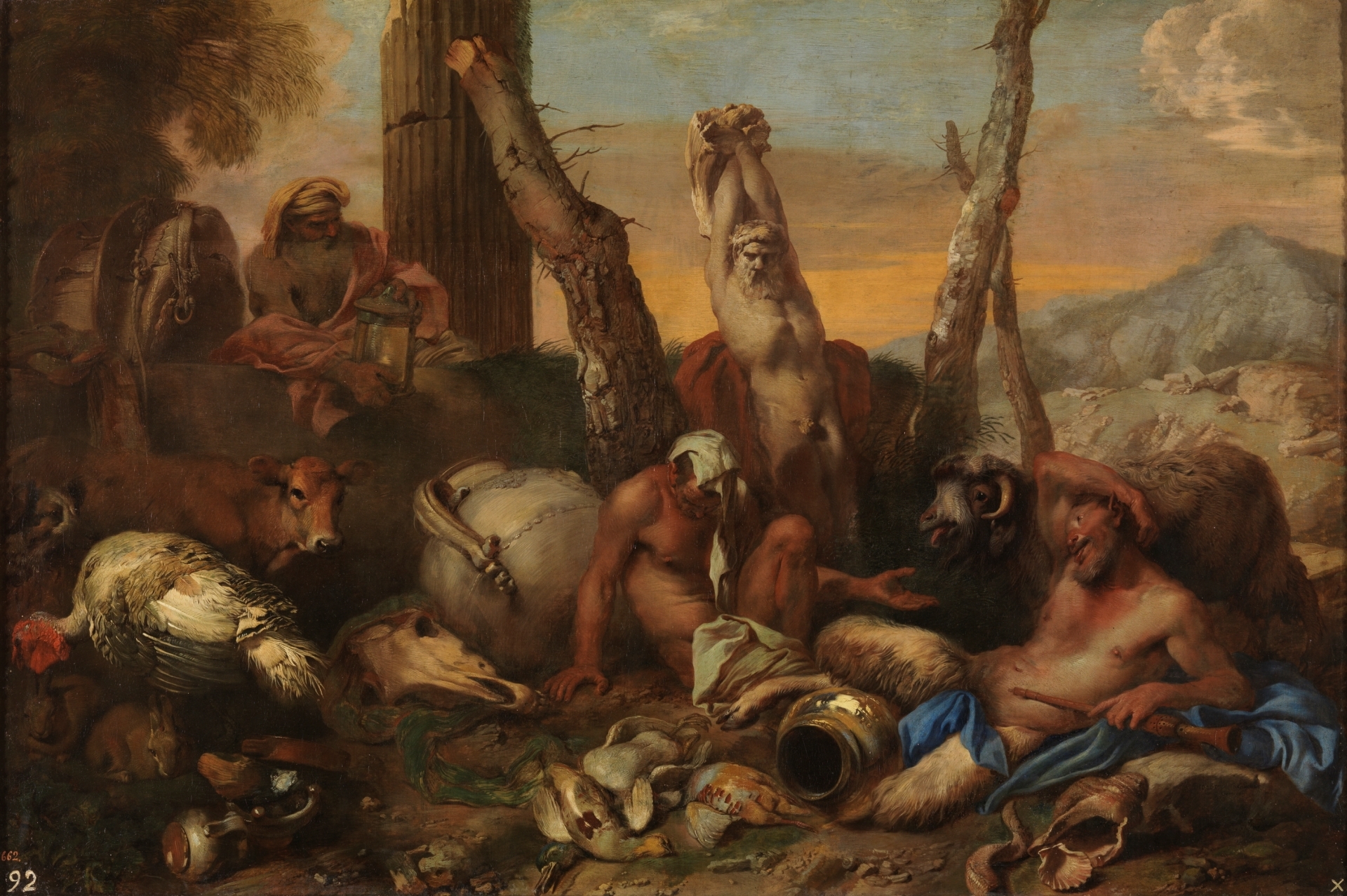 Diogenes searching for a Man, to G. B. Castiglione (c. 1645 - 1655), in the Prado Museum The stories told of Diogenes illustrate the logical consistency of his character. He inured himself to the weather by living in a clay wine jar[5][19] belonging to the temple of Cybele.[20] He destroyed the single wooden bowl he possessed on seeing a peasant boy drink from the hollow of his hands. He then exclaimed: "Fool that I am, to have been carrying superfluous baggage all this time!".[21][22] It was contrary to Athenian customs to eat within the marketplace, and still he would eat there, for, as he explained when rebuked, it was during the time he was in the marketplace that he felt hungry. He used to stroll about in full daylight with a lamp; when asked what he was doing, he would answer, "I am looking for a man."[23] Modern sources often say that Diogenes was looking for an "honest man", but in ancient sources he is simply "looking for a man" – "ἄνθρωπον ζητῶ".[24] This has been interpreted to mean that, in his view, the unreasoning behavior of the people around him meant that they did not qualify as men. Diogenes looked for a man but reputedly found nothing but rascals and scoundrels.[25] Diogenes taught by living example. He tried to demonstrate that wisdom and happiness belong to the man who is independent of society and that civilization is regressive. He scorned not only family and socio-political organization, but also property rights and reputation. He even rejected traditional ideas about human decency. In addition to eating in the marketplace,[26] Diogenes is said to have urinated on some people who insulted him,[27] defecated in the theatre,[28] masturbated in public, and pointed at people with his middle finger, which was considered insulting.[29] Diogenes Laërtius also relates that Diogenes would spit and fart in public.[30] When asked about his eating in public Diogenes said, "If taking breakfast is nothing out of place, then it is nothing out of place in the marketplace."[31] On the indecency of his masturbating in public he would say, "If only it were as easy to banish hunger by rubbing my belly."[31] 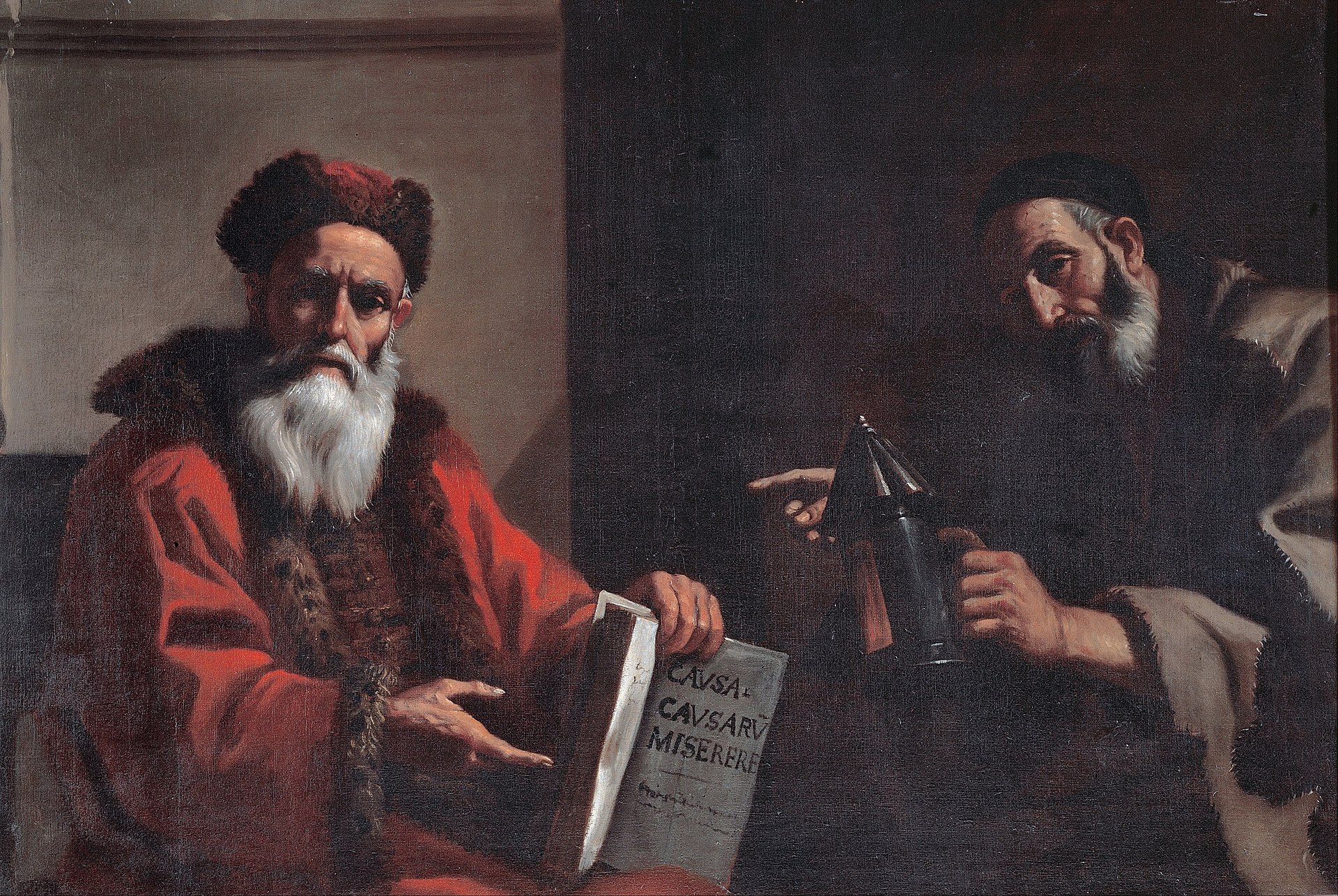 Plato and Diogenes (17th century) by Mattia Preti Diogenes had nothing but disdain for Plato and his abstract philosophy.[32] Diogenes viewed Antisthenes as the true heir to Socrates, and shared his love of virtue and indifference to wealth,[33] together with a disdain for general opinion.[34] Diogenes shared Socrates's belief that he could function as doctor to men's souls and improve them morally, while at the same time holding contempt for their obtuseness. Plato once described Diogenes as "a Socrates gone mad."[35] According to Diogenes Laërtius, when Plato gave the tongue-in-cheek[36] definition of man as "featherless bipeds", Diogenes plucked a chicken and brought it into Plato's Academy, saying, "Here is Plato's man" (Οὗτός ἐστιν ὁ Πλάτωνος ἄνθρωπος), and so the academy added "with broad flat nails" to the definition.[37] Corinth According to a story which seems to have originated with Menippus of Gadara,[38] Diogenes was captured by pirates while on voyage to Aegina and sold as a slave in Crete to a Corinthian named Xeniades. Being asked his trade, he replied that he knew no trade but that of governing men, and that he wished to be sold to a man who needed a master. Xeniades liked his spirit and hired Diogenes to tutor his children. As tutor to Xeniades's two sons,[39] it is said that he lived in Corinth for the rest of his life, which he devoted to preaching the doctrines of virtuous self-control. There are many stories about what actually happened to him after his time with Xeniades's two sons. There are stories stating he was set free after he became "a cherished member of the household", while one says he was set free almost immediately, and still another states that "he grew old and died at Xeniades's house in Corinth."[40] He is even said to have lectured to large audiences at the Isthmian Games.[41] Although most of the stories about his living in a jar[5] are located in Athens, Lucian recounts a tale where he lived in a jar near the gymnasium in Corinth.[42] 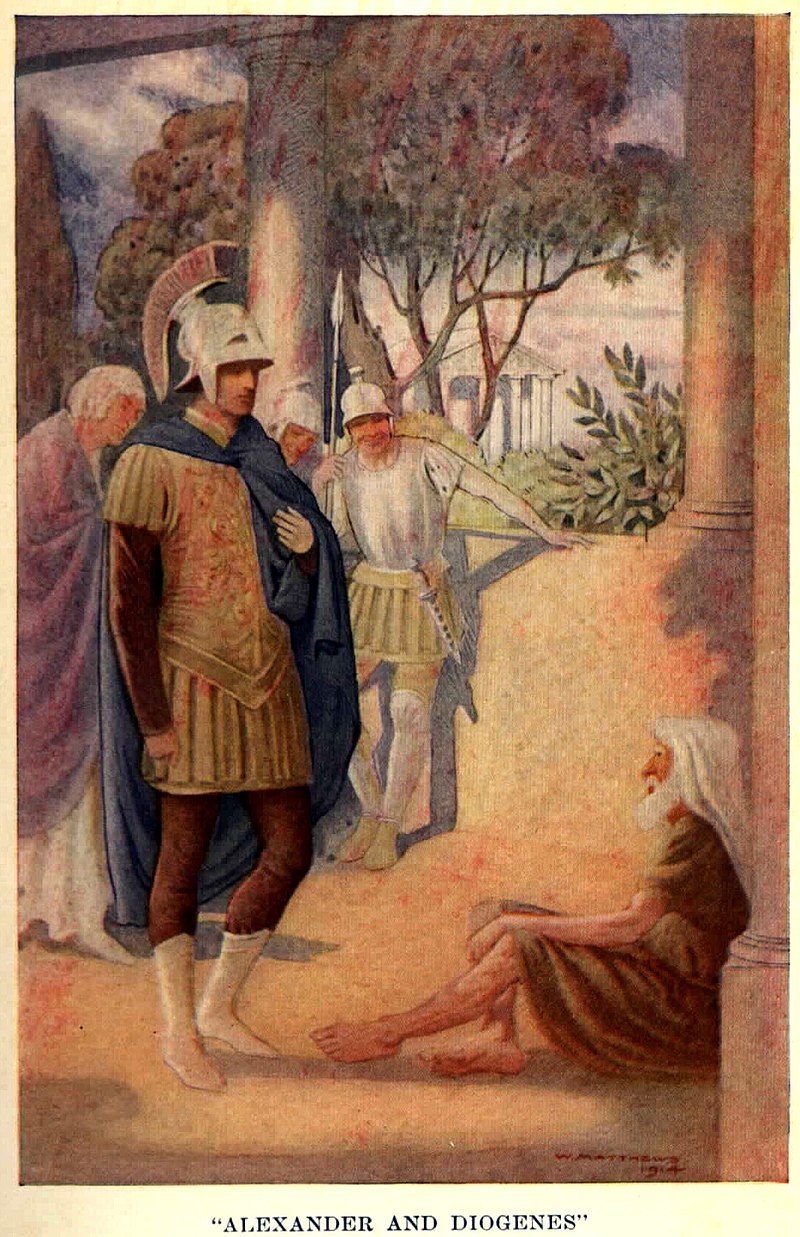 Alexander the Great Visits Diogenes at Corinth by W. Matthews (1914) It was in Corinth that a meeting between Alexander the Great and Diogenes is supposed to have taken place.[43] These stories may be apocryphal. The accounts of Plutarch and Diogenes Laërtius recount that they exchanged only a few words: while Diogenes was relaxing in the morning sunlight, Alexander, thrilled to meet the famous philosopher, asked if there was any favour he might do for him. Diogenes replied, "Yes, stand out of my sunlight." Alexander then declared, "If I were not Alexander, then I should wish to be Diogenes."[7][8] In another account of the conversation, Alexander found the philosopher looking attentively at a pile of human bones. Diogenes explained, "I am searching for the bones of your father but cannot distinguish them from those of a slave." Death There are conflicting accounts of Diogenes's death. His contemporaries alleged that he held his breath until he died, although other accounts of his death say he became ill from eating raw octopus[44] or from an infected dog bite.[45] When asked how he wished to be buried, he left instructions to be thrown outside the city wall so that wild animals could feast on his body. When asked if he minded this, he said, "Not at all, as long as you provide me with a stick to chase the creatures away!" When asked how he could use the stick since he would lack awareness, he replied: "If I lack awareness, then why should I care what happens to me when I am dead?"[46] To the end, Diogenes made fun of people's excessive concern with the "proper" treatment of the dead. The Corinthians erected to his memory a pillar on which rested a dog of Parian marble.[47] It was alleged by Plutarch and Diogenes Laërtius that both Diogenes and Alexander died on the same day; however, the actual death date of neither man can be verified.[48] |
生涯 ディオゲネスの生い立ちについては、父ヒセシアスが銀行家であったこと以外は何も分かっていない[9]。 ある時期(正確な時期は不明)、ヒセシアスとディオゲネスは通貨の捏造や堕落に関わるスキャンダルに巻き込まれ[10]、ディオゲネスは都市から追放さ れ、市民権とすべての財産を失った。 [紀元前4世紀中頃のシノペで、大きなノミで刻印を潰された大量の硬貨が発見されており、当時の他の硬貨には、鋳造した役人としてヒセシアスの名前が記さ れている[13]。 [13]この時期、シノープでは多くの偽札が流通していた[11]。コインは法定通貨としての価値を失わせるために意図的に汚された[11]。4世紀当 時、シノープでは親ペルシア派と親ギリシャ派の間で紛争が起きており、この行為の背景には金銭的な動機よりも政治的な動機があったのかもしれない。 アテネ  ジャン=レオン・ジェローム作『浴槽に座るディオゲネス』(1860年) 一説によると[12]、ディオゲネスはデルフィの神託所に行き助言を求めたところ、「通貨を汚す」べきだと言われたという。シノープでの大失敗の後、ディ オゲネスは、神託は実際の硬貨ではなく、政治的な通貨を汚すべきだという意味だと判断した。彼はアテネに渡り、既成の習慣や価値観に挑戦することを人生の 目標とした。彼は、悪の本質について悩む代わりに、人々は慣習的な解釈に頼っているだけだと主張した。ディオゲネスはマネスという奴隷を連れてアテネに到 着したが、その奴隷は間もなくマネスから逃げ出した。ディオゲネスは独特のユーモアで、「マネがディオゲネスなしで生きられるなら、マネなしのディオゲネ スでもいいじゃないか」[14]と言って、彼の不運を退けた。ディオゲネスは、このような極端な依存関係をあざ笑った。彼はソクラテスの弟子であるアン ティステネスの禁欲的な教えに惹かれた。ディオゲネスがアンティステネスに指導を求めたところ、アンティステネスは彼を無視し、「ついには杖で殴り飛ばし た」と伝えられている。ディオゲネスはこう答えた。"叩け。お前が何か言いたいことがあると思う限り、私をお前から遠ざけるのに十分な硬さの木は見つから ないだろう"。ディオゲネスは、当初は残忍な態度で迎えられたにもかかわらず、アンティステネスの弟子となった[15]。2人が実際に会ったことがあるか どうかはまだ定かではないが[16][17][18]、名声と生活の厳しさの両方で師を凌駕した。彼は、自分が地上の快楽を避けたのは、現代のアテナイの 行動と対照的であり、それに対するコメントであると考えていた。このような態度は、彼が人間の行いの愚かさ、見せかけ、虚栄心、自己欺瞞、人為的なものと みなしたものに対する軽蔑に根ざしていた。  男を探すディオゲネス』G.B.カスティリオーネ(1645年頃~1655年)、プラド美術館蔵 ディオゲネスについて語られる物語は、彼の性格の論理的一貫性を示している。ディオゲネスは、キュベレ神殿にあった土製のワイン壷[5][19]の中で生 活することで天候に耐えていた。そしてこう叫んだ: 「市場の中で食事をすることはアテナイの習慣に反していたが、それでも彼は市場で食事をした。現代の資料では、ディオゲネスは「正直な男」を探していたと 書かれていることが多いが、古代の資料では単に「男を探している」、すなわち「ἄνθρωπον ζητῶ」と書かれている[24]。これは、彼の考えでは、周囲の人々の理不尽な振る舞いは男としてふさわしくないという意味であったと解釈されている。 ディオゲネスは人を探したが、悪党や悪党しか見つからなかったと言われている[25]。彼は、知恵と幸福は社会から独立した人間のものであり、文明は逆行 するものであることを示そうとした。彼は家族や社会政治組織だけでなく、財産権や名声も軽蔑した。人間の良識に関する伝統的な考えさえも否定した。ディオ ゲネスは市場で食事をしただけでなく[26]、彼を侮辱した人々に放尿し、[27]劇場で排便し、[28]公衆の面前で自慰をし、侮辱的とされた中指で人 々を指さしたと言われている[29]。 ディオゲネス・ラエルティウスはまた、ディオゲネスが公衆の面前で唾を吐いたり、屁をこいたりしたとも述べている。 [30] 人前で食事をすることについて尋ねられたディオゲネスは、「朝食をとることが場違いでないなら、市場で食べることも場違いではない」と答えた[31] 。  マッティア・プレティ作『プラトンとディオゲネス』(17世紀) ディオゲネスはプラトンとその抽象的な哲学を軽蔑していた[32]。ディオゲネスはアンティステネスをソクラテスの真の後継者とみなし、徳への愛と富への 無関心を共有し[33]、一般的な意見を軽蔑していた[34]。ディオゲネスは人の魂の医者として機能し、彼らを道徳的に向上させることができるというソ クラテスの信念を共有していたが、同時に彼らの鈍感さを軽蔑していた。プラトンはディオゲネスを「狂ったソクラテス」と形容した。 「ディオゲネス・ラエルティウスによれば、プラトンが人間とは「羽のない二足動物」であると舌鋒鋭く[36]定義したとき、ディオゲネスはニワトリをむし り取ってプラトンのアカデミーに持ち込んだ、 プラトンが「羽のない二足動物」と定義したとき、ディオゲネスはニワトリを抜いてプラトンのアカデミーに持ち込み、「これがプラトンの人間だ」と言った。 [37] コリント ガダラのメニッポスに由来すると思われる話[38]によると、ディオゲネスはエギナへの航海中に海賊に捕らえられ、クレタ島でゼニアデスというコリント人 に奴隷として売られた。職業を尋ねられたディオゲネスは、自分は人を治めること以外に職業は知らない、主人を必要とする人に売られたいと答えた。クセニア デスは彼の精神を気に入り、ディオゲネスを自分の子供たちの家庭教師に雇った。クセニアデスの二人の息子の家庭教師として[39]、彼は残りの生涯をコリ ントで過ごし、高潔な自制の教義を説くことに専念したと言われている。クセニアデスの二人の息子と過ごした後、彼に実際に何が起こったかについては多くの 話がある。家庭の大事な一員」となってから自由になったという話もあれば、ほとんどすぐに自由になったという話もあり、また「年老いてコリントのゼニアデ スの家で死んだ」という話もある[40]。  『アレクサンドロス大王、コリントのディオゲネスを訪問』W.マシューズ著(1914年) アレクサンダー大王とディオゲネスとの会談はコリントで行われたとされている[43]。プルタークとディオゲネス・ラエルティウスの記述によれば、二人は ほんの少し言葉を交わしただけであった。ディオゲネスが朝日を浴びてくつろいでいるとき、アレクサンダーは有名な哲学者に会って感激し、何か頼みごとがあ るかと尋ねた。ディオゲネスはこう答えた。アレクサンダーは、「もし私がアレクサンダーでなかったら、ディオゲネスになりたかった」と言った[7][8] 。ディオゲネスは、"私はあなたの父親の骨を探しているが、奴隷の骨と区別がつかない "と説明した。 死 ディオゲネスの死については、さまざまな説がある。同時代の人々は、ディオゲネスは死ぬまで息を止めたと主張したが、彼の死に関する他の記述によると、彼 は生のタコを食べて病気になった[44]、あるいは感染した犬に噛まれて病気になったという[45]。このことを気にしていたのかと尋ねられると、彼は 「動物を追い払うための棒さえ用意してくれれば、全然かまわないよ!」と答えた。意識がないのだから、どうやって棒を使うのかと尋ねると、彼はこう答え た: 「もし私に意識がないのなら、私が死んだらどうなるかを気にする必要はないだろう」[46]。ディオゲネスは最後まで、死者の「適切な」扱いについて人々 が過剰に気にすることを揶揄した。プルタークとディオゲネス・ラエルティウスは、ディオゲネスとアレクサンダーが同じ日に死んだと主張しているが、実際の 死亡日はどちらも確認されていない[48]。 |
| Philosophy Along with Antisthenes and Crates of Thebes, Diogenes is considered one of the founders of Cynicism. The ideas of Diogenes, like those of most other Cynics, must be arrived at indirectly. Fifty-one writings of Diogenes survive as part of the spurious Cynic epistles, though he is reported to have authored over ten books and seven tragedies that do not survive.[49] Cynic ideas are inseparable from Cynic practice; therefore what is known about Diogenes is contained in anecdotes concerning his life and sayings attributed to him in a number of scattered classical sources. Many anecdotes of Diogenes refer to his dog-like behavior and his praise of a dog's virtues. It is not known whether Diogenes was insulted with the epithet "doggish" and made a virtue of it, or whether he first took up the dog theme himself. When asked why he was called a dog he replied, "I fawn on those who give me anything, I yelp at those who refuse, and I set my teeth in rascals."[19] One explanation offered in ancient times for why the Cynics were called dogs was that Antisthenes taught in the Cynosarges gymnasium at Athens.[50] The word Cynosarges means the place of the white dog. Later Cynics also sought to turn the word to their advantage, as a later commentator explained:  Diogenes (1873) by Jules Bastien-Lepage There are four reasons why the Cynics are so named. First because of the indifference of their way of life, for they make a cult of indifference and, like dogs, eat and make love in public, go barefoot, and sleep in tubs and at crossroads. The second reason is that the dog is a shameless animal, and they make a cult of shamelessness, not as being beneath modesty, but as superior to it. The third reason is that the dog is a good guard, and they guard the tenets of their philosophy. The fourth reason is that the dog is a discriminating animal which can distinguish between its friends and enemies. So do they recognize as friends those who are suited to philosophy, and receive them kindly, while those unfitted they drive away, like dogs, by barking at them.[51] Diogenes believed human beings live hypocritically and would do well to study the dog. Besides performing natural body functions in public with ease, a dog will eat anything and makes no fuss about where to sleep. Dogs live in the present and have no use for pretentious philosophy. They know instinctively who is friend and who is foe. Diogenes stated that "other dogs bite their enemies, I bite my friends to save them."[52] Diogenes maintained that all the artificial growths of society were incompatible with happiness and that morality implies a return to the simplicity of nature. So great was his austerity and simplicity that the Stoics would later claim him to be a wise man or "sophos". In his words, "Humans have complicated every simple gift of the gods."[53] Although Socrates had previously identified himself as belonging to the world, rather than a city,[54] Diogenes is credited with the first known use of the word "cosmopolitan". When he was asked from where he came, he replied, "I am a citizen of the world (cosmopolites)".[55] This was a radical claim in a world where a man's identity was intimately tied to his citizenship of a particular city-state. As an exile and an outcast, a man with no social identity, Diogenes made a mark on his contemporaries. |
哲学 アンティステネスやテーベのクラテスと並んで、ディオゲネスはシニシズムの創始者の一人と考えられている。ディオゲネスの思想は、他のほとんどのキニクス の思想と同様、間接的に到達したものである。ディオゲネスの51の著作は偽のキニク書簡の一部として残っているが、彼は10以上の著書と7つの悲劇を書い たと報告されているが、それらは残っていない[49]。 ディオゲネスの逸話の多くは、彼の犬のような行動と犬の美徳を賞賛することに言及している。ディオゲネスが "犬っぽい "という蔑称で侮辱され、それを美徳としたのか、ディオゲネス自身が最初に犬というテーマを取り上げたのかは定かではない。なぜ犬と呼ばれるのかと尋ねら れたとき、彼は「私は何でもくれる者には媚び、拒む者には吠え、ならず者には歯を立てる」と答えている[19]。なぜキニクス派が犬と呼ばれたのかについ て古代に提示された説明のひとつは、アンティステネスがアテナイのキノサルゲスの体育館で教えていたというものであった[50]。後世のキニク派もまた、 この言葉を自分たちに有利になるように使おうとしたと、後の注釈者が説明している:  ジュール・バスティアン=ルパージュによる『ディオゲネス』(1873年) キニクスの名がそう呼ばれる理由は4つある。彼らは無関心を崇拝し、犬のように公衆の面前で食事をし、愛し合い、裸足になり、浴槽や十字路で寝るからであ る。第二の理由は、犬は恥知らずな動物であり、彼らは恥知らずを崇拝する。第三の理由は、犬は良い番人であり、彼らは自分たちの哲学の信条を守るからであ る。第四の理由は、犬は敵味方の区別がつく動物だからである。だから彼らは、哲学に適した者を友と認め、親切に迎え入れ、適さない者は犬のように吠えつけ て追い払うのである[51]。 ディオゲネスは、人間は偽善的に生きており、犬を研究するのがよいと考えていた。公衆の面前で簡単に自然な身体機能を果たすだけでなく、犬は何でも食べる し、寝る場所にもこだわらない。犬は今を生きており、気取った哲学など何の役にも立たない。彼らは本能的に誰が味方で誰が敵かを知っている。 ディオゲネスは「他の犬は敵を噛むが、私は友人を噛んで救う」と述べている。彼の厳格さと単純さは、後にストア派が彼を賢者あるいは「ソフォス」であると 主張するほどであった。彼の言葉によれば、「人間は神々のあらゆる単純な贈り物を複雑にしてしまった」[53]。ソクラテスは以前、自らを都市ではなく世 界に属していると認識していたが[54]、ディオゲネスは「コスモポリタン」という言葉を初めて使ったとされている。これは、人間のアイデンティティが特 定の都市国家の市民権と密接に結びついていた世界では急進的な主張であった。亡命者であり、社会的アイデンティティを持たない追放者であったディオゲネス は、同時代の人々に大きな足跡を残した。 |
| Legacy Depictions in art 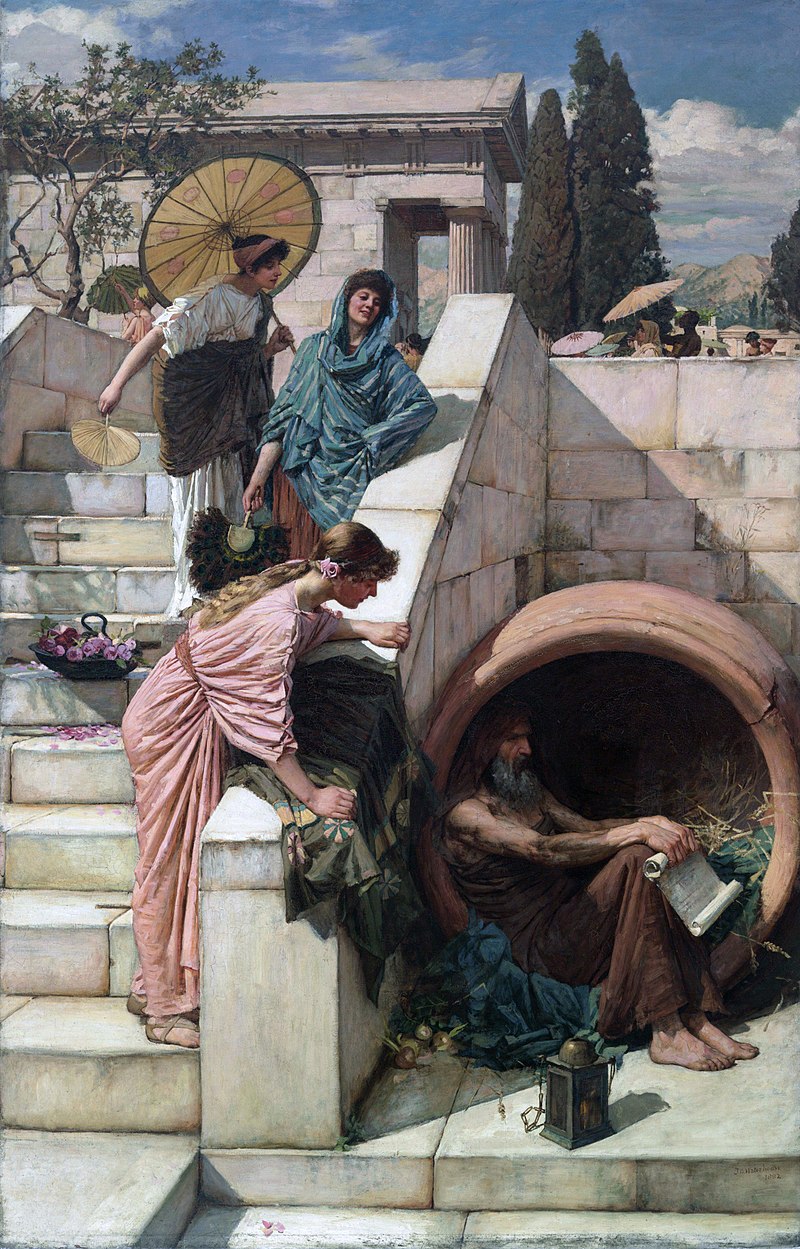 Diogenes (1882) by John William Waterhouse Both in ancient and in modern times, Diogenes's personality has appealed strongly to sculptors and to painters. Ancient busts exist in the museums of the Vatican, the Louvre, and the Capitol. The interview between Diogenes and Alexander is represented in an ancient marble bas-relief found in the Villa Albani. In Raphael's fresco The School of Athens, a lone reclining figure in the foreground represents Diogenes.[56] The many allusions to dogs in Shakespeare's Timon of Athens are references to the school of Cynicism that could be interpreted as suggesting a parallel between the misanthropic hermit, Timon, and Diogenes; but Shakespeare would have had access to Michel de Montaigne's essay, "Of Democritus and Heraclitus", which emphasised their differences: Timon actively wishes men ill and shuns them as dangerous, whereas Diogenes esteems them so little that contact with them could not disturb him.[57] "Timonism" is in fact often contrasted with "Cynicism": "Cynics saw what people could be and were angered by what they had become; Timonists felt humans were hopelessly stupid & uncaring by nature and so saw no hope for change."[58] The philosopher's name was adopted by the fictional Diogenes Club, an organization that Sherlock Holmes' brother Mycroft Holmes belongs to in the story "The Greek Interpreter" by Sir Arthur Conan Doyle. It is called such as its members are educated, yet untalkative and have a dislike of socialising, much like the philosopher himself.[59] Psychology Main article: Diogenes syndrome Diogenes's name has been applied to a behavioural disorder characterised by apparently involuntary self-neglect and hoarding.[60] The disorder afflicts the elderly and is quite inappropriately named, as Diogenes deliberately rejected common standards of material comfort, and was anything but a hoarder.[61] |
遺産 芸術における描写  ディオゲネス (1882) ジョン・ウィリアム・ウォーターハウス作 古今東西、ディオゲネスの個性は彫刻家や画家たちに強くアピールしてきた。古代の胸像はバチカン、ルーブル、国会議事堂の美術館にある。ディオゲネスとア レクサンダーの対談は、アルバーニ荘で発見された古代の大理石の浮き彫りで表現されている。ラファエロのフレスコ画『アテネの学堂』では、前景の一人の涅 槃像がディオゲネスを表している[56]。 シェイクスピアの『アテネのティモン』における犬に関する多くの言及は、シニシズム学派への言及であり、人間嫌いの隠者であるティモンとディオゲネスの間 の並列を示唆していると解釈することができるが、シェイクスピアはミシェル・ド・モンテーニュのエッセイ『デモクリトスとヘラクレイトスについて』にアク セスすることができたであろう: ティモンは積極的に人の病気を願い、危険な存在として敬遠するのに対し、ディオゲネスは人と接触しても邪魔にならないほど人を軽んじている[57]: 「シニシズムは人間がどうあるべきかを考え、そうなってしまったことに怒り、ティモニストは人間が生まれつき絶望的に愚かで思いやりがないと感じ、変化の 望みを見いだせなかった」[58]。 この哲学者の名前は、サー・アーサー・コナン・ドイルによる物語『ギリシアの通訳』でシャーロック・ホームズの弟マイクロフト・ホームズが所属する架空の 組織、ディオゲネス・クラブに採用された。メンバーは教養がありながら無口で、人付き合いを嫌うため、哲学者自身と同じようにそう呼ばれている[59]。 心理学 主な記事 ディオゲネス症候群 ディオゲネスの名前は、明らかに不本意な自己放任と溜め込みによって特徴づけられる行動障害に適用されている[60]。この障害は高齢者を悩ませ、ディオ ゲネスは物質的な快適さの一般的な基準を意図的に拒否し、溜め込み家以外の何者でもなかったことから、非常に不適切な名前である[61]。 |
| https://en.wikipedia.org/wiki/Diogenes |
|
リ ンク
文 献
そ の他の情報
Copyleft, CC, Mitzub'ixi Quq Chi'j, 1996-2099
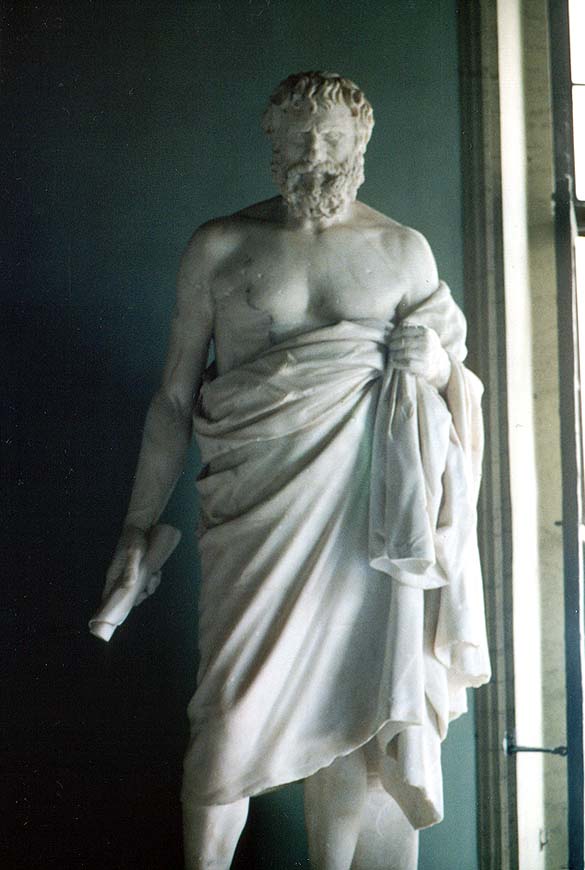
Statue
of an unknown Cynic philosopher from the Capitoline Museums in Rome.
This statue is a Roman-era copy of an earlier Greek statue from the
third century BC.[1] The scroll in his right hand is an 18th-century
restoration.
☆
 ☆
☆